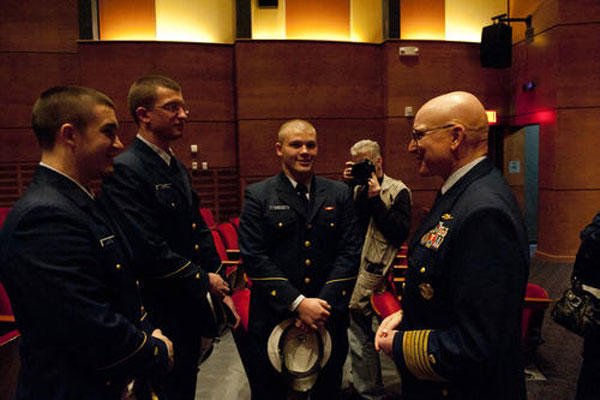The start of the spring semester began this week at the United States Coast Guard Academy, and Coast Guard Commandant Adm. Bob Papp traveled to the New London, Conn.-based institution to continue the tradition of delivering a leadership address to the corps of cadets.
“As you all know, the keel is the foundation of a ship. The academy helps to build your foundation and lay your keel for your Coast Guard career and for your life. And one of the most important things for you to start building is a fundamental part of that foundation, and that is proficiency,” said the Commandant. “Proficiency in craft, proficiency in leadership and disciplined initiative. If you want to be an effective leader – if you want to serve your crew and your country to the very best of your ability, you must master these three things. There is no short cut.”
Many in the crowd were seniors from the Class of 2013 who will be graduating in less than six months. In May, the crop of newly-commissioned ensigns will travel across the country to report to their first duty stations, something the Commandant himself did more than 40 years earlier.
“When you leave here, you will be conducting front-line Coast Guard operations. We face many challenges out there,” said the Commandant. “I call them ‘uncertain and stormy seas.’ The continued flow of drugs and migrants towards our shores. Threats to our fisheries. Increased activity in the Arctic. Our mandate to protect the safe and secure approaches to American ports. And sometimes, even to protect even the sea itself.”
As the senior cadets trained at the academy for the past four years, Coast Guard units saw increased activity in the Arctic and responded to unprecedented environmental disaster in the aftermath of the Deepwater Horizon explosion. The Commandant used the address as an opportunity to discuss the importance of becoming proficient, breaking down the concept of proficiency into three components: proficiency in craft, proficiency in leadership and a disciplined initiative.
“The long hours and the difficult work it takes to build proficiency is not easy – neither is the academy. Right now, you begin your journey towards proficiency – the kind that Richard Etheridge demonstrated over 100 years ago and the kind that the men and women of this service have consistently demonstrated before and since,” said the Commandant.
In closing, he emphasized, “To meet these threats, you must continually build your proficiency. It will serve as an anchor to which you can hold fast in uncertain and stormy seas. And we don’t fear uncertain and stormy seas. That’s when we go to work. That’s when our country needs us the most. And that’s when we are at our best.”
When the event shifted to a question and answer format, cadets were given an opportunity to have their questions answered directly by the Commandant. 4th Class Cadet Hayley Smith from Scotland, Conn., raised her hand.
Smith, who spent a year in preparatory school and four years in the Navy JROTC unit before coming to the academy, asked what challenges the service might be presented by sequestration and the “fiscal cliff.” The Commandant explained the current situation in Congress was unprecedented in his time as a senior military officer. He told Smith there would be no shortage of challenges, but by the time she graduated in four years, “there will still be a Coast Guard that needs proficient leaders.”


























